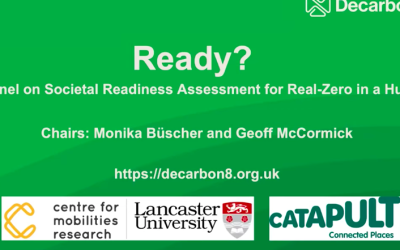We have formed a partnership with the aim of creating the seed of a functioning and growing Hydrogen (H2) society and economy across the region.
The Hub, coordinated via Energy Lancaster at Lancaster University, brings together (i) Local and global energy & technology firms, (ii) local transport companies & heat consumers, (iii) Clean-air, planning, generation & low-carbon stakeholders (including Councils & LEPs), (iv) Scientists, economists, engineers.
The team at the Centre for Mobilities Research (CeMoRe) develop a deeper understanding of how people would use H2. Social practices and perceptions are important: How would we live in a hydrogen society/economy? What concerns do people have? How can social, technological, organisation innovation be synchronised?
This is more than an idea. We aim to:
- Build and grow local H2 production, storage, and transport facilities;
- Decarbonise local industry & transport and heating of buildings;
- Demonstrate a scalable H2 society/economy rolled out via incremental infrastructure investments.
The surrounding district offers opportunities to showcase hydrogen-based transport on rail, road, and in the port, and hydrogen supported heating in estates like the University campus, the new Eden Project North, and the Bailrigg Garden Village. Hub concepts include:
Green H2: Nuclear power and renewable energy can be used to produce ‘green’ hydrogen.
H2Rail: Diesel powered trains currently provide transport through much of Cumbria. These trains can run on H2. This would enable H2-based train and bus services and also H2 refuelling stations for cars in the National Park.
H2Sea: Like other seaports Heysham strives to reduce their local emissions, first by converting the container handling vehicles to run on H2and later by offering H2as a (supplement) fuel for ferries.
H2Road: Junction 34 off the M6 with its recently opened park-and-ride system and connecting bus services will make an ideal host for the North-West’s first H2refuelling station for cars, buses, and H2fuelled shuttle services to Lancaster city and the Eden Project.
H2Transport: We will work with bus operators and the City Council to develop H2based/supplemented bus and refuse collection services, combating the higher emissions that contribute to the city’s air quality issues.
H2Energy Systems at Scale: These broad transport and built environment concepts support Lancaster’s case for piloting an H2economy and society at a local scale, further enhanced by significant H2storage potential. The Lancaster hydrogen Hub can demonstrate scale up from campus/city to regional and national.
H2Research, Development, Demonstration and Innovation: Our research and innovation project will go beyond electrolyser and fuel cell technology: We and our partners will address fuel and transport related logistics, the use of H2to as an energy source in smart local energy systems (for transport, heating, grid), new business models, and the geological, environmental, health and social aspects of larger scale H2storage projects.
Prof Harry E. Hoster, Director of Energy Lancaster, h.hoster@lancaster.uk
Dr Richard Dawson, Energy Lancaster, r.dawson@lancaster.ac.uk
Steve Wrigley, Energy Lancaster, s.wrigley@lancaster.uk
Martin Gilmore, head of Business Engagement for Physical Sciences. M.gilmore@lancaster.uk
Prof Monika Büscher, Director of the Centre for Mobilities Research, m.buscher@lancaster.uk
Prof Katy Mason, Lancaster Management School, k.mason@lancaster.ac.uk




